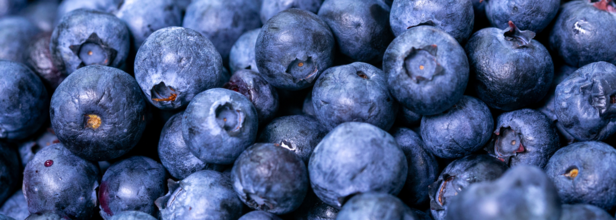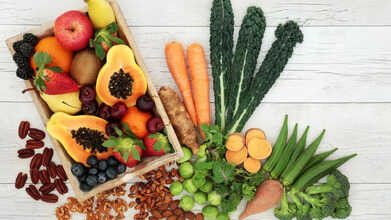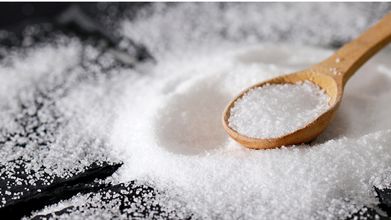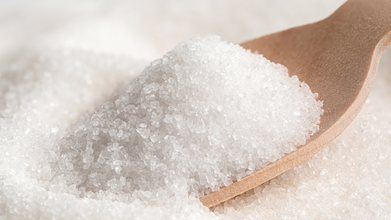- Health Conditions A-Z
- Health & Wellness
- Nutrition
- Fitness
- Health News
- Ayurveda
- Videos
- Medicine A-Z
- Parenting
FDA Recalls Blueberries Over Listeria Risk Ahead of July 4th Festivities

Credits: Canva
As the United States gears up for festive summer gatherings and red-white-and-blue desserts ahead of the Fourth of July, the U.S. Food and Drug Administration (FDA) has issued a high-alert warning for one holiday staple—organic blueberries.
12,000 Pounds of Berries Recalled
On Tuesday, the FDA announced a recall involving 12,000 pounds of organic bulk blueberries distributed by Alma Pak International LLC, a company based in Alma, Georgia. The berries, according to the agency, tested positive for Listeria monocytogenes, a potentially dangerous bacteria known to cause foodborne illness.
“During routine testing, the firm received positive test results of Listeria monocytogenes on their finished product,” the FDA said in its official notice. The blueberries were reportedly shipped to a single customer in North Carolina, although the agency did not clarify whether that customer was a retailer, distributor, or foodservice business.
The recalled products include:
Product: Organic Bulk Blueberries
Lot Numbers: 13325 G1060 and 13325 G1096
Quantity: 400 boxes weighing 30 pounds each
Recalling Firm: Alma Pak International LLC, Alma, GA
While the recall was first initiated on June 9, it wasn’t until this week that the FDA categorized it as a Class I recall—the most severe classification. Class I recalls are reserved for situations in which there is a reasonable probability that the product will cause serious health consequences or even death.
Listeria Concerns Continue to Rise
This incident is part of a broader trend in recent months, with Listeria monocytogenes making frequent appearances in food safety recalls. Just this year, products like shrimp, pasta, and cheese have been pulled from shelves over similar contamination concerns.
Listeria infection, or Listeriosis, is particularly risky for vulnerable populations such as pregnant people, older adults, and individuals with weakened immune systems. According to the Cleveland Clinic, symptoms may include fever, headache, muscle aches, vomiting, and diarrhea. In more severe cases, Listeriosis can lead to complications such as meningitis or miscarriage.
Food Safety in Summer
Food poisoning incidents tend to spike in the summer, largely because perishable items are often left unrefrigerated for long periods during picnics and barbecues. With blueberries often used in patriotic-themed desserts and salads, this recall serves as a timely reminder to double-check product labels and lot numbers.
If you’re uncertain about the origins of berries at your upcoming holiday gathering, experts advise erring on the side of caution. “When in doubt, leave it out,” remains sound food safety advice—especially when vulnerable guests are involved.
As of now, no illnesses have been reported in connection with the recalled blueberries. Consumers are encouraged to monitor FDA announcements for further updates and to discard or return any product that may be part of the affected lot.
This Everyday Breakfast Habit Could Quietly Cut Heart Disease Risk

Credits: Canva
A key ingredient found in a common breakfast food may play an important role in supporting heart health and keeping blood sugar levels steady. Fibre is an essential part of a balanced diet, and the NHS recommends that adults aim for at least 30g of fibre each day. Despite this, many people still fall short of the daily target, often without realising the long-term impact on their health.
Why Fibre Matters For Heart And Blood Sugar Health
Fibre is not a single substance. It exists in two main forms, and each affects the body in a different way. Insoluble fibre does not dissolve during digestion. Instead, it passes through the gut largely unchanged, adding bulk to stools and helping the bowels move regularly. This can lower the risk of constipation and reduce the chances of developing intestinal blockages.
How Soluble Fibre Helps Control Blood Sugar Levels
Soluble fibre behaves differently. When it comes into contact with water in the digestive system, it forms a gel-like substance. This slows the digestion and absorption of carbohydrates, helping to prevent sudden rises in blood sugar after meals. Because of this effect, soluble fibre can be particularly useful for people managing blood sugar conditions, including diabetes.
What Makes Beta-Glucan Especially Good For The Heart?
Beta-glucans are a specific type of soluble fibre that have attracted attention for their heart-protective benefits. According to the British Heart Foundation, beta-glucan is naturally present in all porridge oats and wholegrains. A standard 40g serving of porridge oats contains around 2g of beta-glucan, making it an easy addition to a heart-friendly diet.
Research suggests that beta-glucan may help improve blood sugar control over time. Studies have found that consuming up to 3.5g of beta-glucan daily can lower blood sugar levels and support better long-term glucose management in people with type 2 diabetes. A higher intake of beta-glucan has also been linked to a reduced risk of developing type 2 diabetes, likely due to its ability to slow sugar absorption.
Beta-Glucan And Its Link To Lower Cholesterol
Another study has highlighted the connection between regular beta-glucan intake and improved heart health. The findings showed that eating just 3g of beta-glucan each day for eight weeks led to a noticeable reduction in cholesterol levels. High cholesterol is a well-known risk factor for heart disease, so even small daily amounts of beta-glucan may offer meaningful benefits.
Sources Of Beta-Glucan
Beta-glucan is found in a wide range of natural foods, including:
- Oats
- Rye
- Shiitake mushrooms
- Peas
- Seaweed
- Yeast
- Reishi mushrooms
- Apples
- Algae
- Barley
- Wheat
Including a variety of these foods in meals can help increase fibre intake in a balanced way.
Possible Side Effects Of Increasing Fibre Intake
As beta-glucan is a form of fibre, increasing intake too quickly can cause mild digestive discomfort. Some people may experience bloating, wind, or constipation, especially in the early stages. These symptoms can often be reduced by staying physically active and drinking enough fluids throughout the day.
If you are concerned about how fibre affects your body, it is advisable to speak with your GP or a qualified health professional. They can offer guidance tailored to your needs. More information on increasing fibre intake and its health benefits is also available on the NHS website.
Is Your Excessive Salt Consumption Increasing Your Risk Of A Stroke?

Credit: Canva
While the World Health Organization recommends 5g or a tablespoon of salt every day, Indians consume more than double, increasing their risk of having a fatal stroke exponentially.
According to EatRightIndia, Indians consume about 11g of salt each day through meals which can significantly increase their risk of high blood pressure, strokes and hypertension.
Hypertension causes over 1.6 million deaths annually, accounting for nearly 18 percent of all fatalities and heavily contributes to deaths caused by heart disease, stroke and kidney disease.
What Is Excessive Salt Dangerous?
The most important side effect of consuming excessive salt intake is high blood pressure. Salt causes the body to retain water, increasing the volume of blood in your vessels and leading to elevated pressure levels. If your blood pressure consistently measures over 140/90 mmHg, it's time to evaluate your salt consumption.
Over time, this can rapidly raise your risk for heart disease, stroke while also potentially contributing to stomach cancer and weakened bones. Additionally, high blood pressure damages kidneys and excess sodium can lead to kidney stones or disease.
Apart from a 5gm recommendation for adults, NHS suggests that children between seven to 11 years of age should not eat more than 5g of salt while those between four to six years of age should eat less than 3g of salt every day to maintain heart health.
How Can You Reduce Your Salt Consumption?
Both excessive and insufficient salt intake have been linked to adverse outcomes. Achieving the right balance is critical, and the best approach is to minimize processed food consumption rather than relying solely on the salt shaker.
Common items such as pickles, paapads, chutneys, salads and buttermilk significantly contribute to daily salt consumption. Hidden salts in packaged goods like biscuits, sauces, condiments and snacks also can increase your salt intake.
To cut down on your salt intake, experts recommend:
- Not adding salt in rice and dough for chapati, poori and paratha.
- Not sprinkling salt on salad, cut fruits, cooked vegetables or curd.
- Gradually reducing the salt usage while cooking from lesser to least.
- Limit food accompaniments like salted butter, salty spice mixes (chaat masala, jal jeera masala etc.), chutneys, pickles, ketchups, sauces and dressings as they contain excess salt.
- Baking soda, baking powder, and monosodium glutamate (MSG) also contains high sodium and should be avoided in your daily cooking.
- Not keeping salt on the table.
- Buying tinned vegetables, pulses or fish in water instead of brine.
- Being aware that some dissolvable tablets, such as painkillers, vitamins or prescription medicines, may be high in salt.
This Low-Calorie Sugar May Be The Safest Alternative For Diabetic Patients, Scientists Say

Credit: Canva
Tagatose, a natural sugar with a third of the calories of table sugar, may be the up-and-coming safe alternative to unhealthy added sugars, scientists say.
Researchers from Tufts University, Massachusetts in partnership with biotechnology companies Manus Bio (US) and Kcat Enzymatic (India), claim that tagatose, found in only small amounts in some dairy products and fruits, is a healthier option than regular sugar and sweeteners.
The experts also claim it this rare natural sugar also does not cause insulin spikes, making it safe for consumption for both Type 1 and 2 diabetes patients. Tagatose has also been previously recognized as safe for consumption by the US Food and Drug Administration (FDA) and the World Health Organization (WHO).
Certain studies have also found tagatose to be 'tooth friendly', as it can limit the growth of harmful microbes in the dental cavity and prevent tooth decay as well as cavities.
How Is Better Than Other Artificial Sweeteners?
Due to being a natural sugar with similar taste and bulk to sugar but fewer calories, minimal blood sugar impact, prebiotic benefits and heat-stable for baking, tagatose is known to better than artificial sweeteners.
Moreover, it also lacks the bitter aftertaste common with some artificial sweeteners such as saccharin and stevia and tastes 92 percent as sweet and 60 percent less calories than common sugar.
With low calories and low absorption, tagatose is an attractive bulk sweetener, meaning it can not only can replace sugar for sweetness but can also provide a similar bulk texture in cooking that comes with adding the sugar in some quantity, something that high intensity sweetener substitutes are unable to do due to their composition.
Can Diabetes Patients Consume It?
Yes, tagatose can be eaten by insulin-resistant people as it's only partially absorbed in the small intestine; much of it being fermented by gut bacteria in the colon. Because of this, its impact on blood glucose and insulin is much less than that of conventional sugar.
Clinical studies show very low increases in plasma glucose or insulin after ingestion of tagatose. However, in the gut, the rare sugar is metabolized in a similar way to the fruit sugar, fructose, meaning those with fructose intolerances may want to steer clear
Where Can I Buy It?
While tagatose is far more beneficials than other commercially-available sugars, it remains unavailable due to limited production. "There are established processes to produce tagatose, but they are inefficient and expensive," explains biological engineer Nik Nair from Tufts.
But it can still be found in milk and other dairy products when lactose is broken down by heat or enzymes, such as yogurt, cheese and kefir. Along with this, fruits such as apples, pineapples and oranges also contain trace levels of tagatose as part of their natural carbohydrate spectrum.
© 2024 Bennett, Coleman & Company Limited

